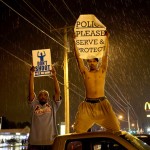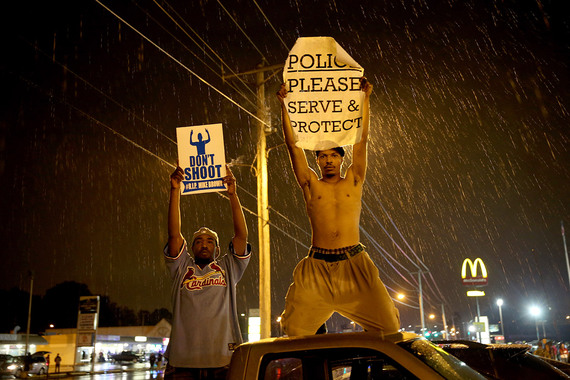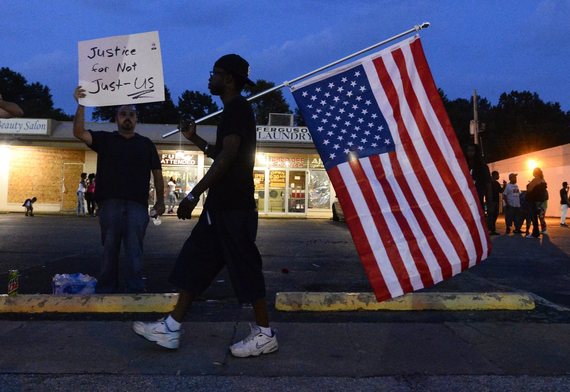
“I’m used to being let down by verdicts like this.” That was the text message my 17-year-old cousin David sent after learning a St. Louis County grand jury failed to indict Police Officer Darren Wilson in the August 9 shooting death of Michael Brown. While hundreds of messages scrolled across my newsfeed, none resonated more than David’s poignant, honest, yet painful text. David, like so many others, was frustrated, saddened and uncertain what to do with the emotions sparked by the grand jury decision. His words reflect the sad truth black males learn at an early age: rarely is there adequate justice for those who look like him. Just …
“I’m used to being let down by verdicts like this.” That was the text message my 17-year-old cousin David sent after learning a St. Louis County grand jury failed to indict Police Officer Darren Wilson in the August 9 shooting death of Michael Brown.
While hundreds of messages scrolled across my newsfeed, none resonated more than David’s poignant, honest, yet painful text.
David, like so many others, was frustrated, saddened and uncertain what to do with the emotions sparked by the grand jury decision. His words reflect the sad truth black males learn at an early age: rarely is there adequate justice for those who look like him. Just a teenager, David is fluent in the hurt and disappointment that regularly come from these unfortunate and divisive events and their aftermath.
While many were glued to their televisions, perplexed by the ruling, prepared for protests, and aggravated by scary and heartless responses from the authorities, I dug deep to start the mourning process. Again. Previously, I mourned for Michael Brown, for his friends and families who felt the impact, for all those harmed in the riots that followed, and for the city of Ferguson in general. I grappled with the fact, proven again and again, that black boys cannot make boyish, naïve and shortsighted choices without risk of being gunned down by individuals drawing on the privilege that comes with a badge and gun — or just a gun and laws like Stand Your Ground.

Now an even graver pain resides, rooted in the realization that as hope for justice dwindles in this case, and far too many cases like it, we must now deal with reality. Like David, we have become used to decisions like this. Many have grown gravely distrustful of our criminal justice system and of the men and women who enforce it vigorously.
Michael Brown was the victim of a crime, but Officer Wilson’s choice is not what people are raging against. Michael and Darren did nothing more than inherit the fear and vitriol simultaneously imbued and masked by racism. The frustration ignited by the grand jury’s decision is far greater than a dispute between two individuals.
The Ferguson case reveals deeper societal implications at the very heart of life in urban areas. Voiceless people deal daily with unfair housing policies, struggling schools, joblessness, staggeringly disproportional rates of incarceration, and grave health care disparities. These issues are too common for low-income urban blacks who are also being policed by implicitly biased law enforcement using excessive force.
If other black boys become used to decisions like this one, how can they — or their families and friends — ever hope to rekindle trust in American justice or democracy? If teenagers know only cynicism of the system that is supposed to protect them, both they and the greater society lose. The awe-inspiring futures that should be theirs will instead be likely cast aside by mistrust of the very institutions that should support and encourage their success.
Surely we are all fatigued by hearing about, living with, and experiencing the effects of a justice system that seems patently unjust to black males. Let’s learn from this setback, gain strength in our solidarity, and commit to reviving hope in our youth that things can change for the better. However, change will only come if we keep talking about it, writing about it, and never allow ourselves to disengage or grow in cynicism to the point of uncaring.

Right now, Ferguson is top of the news cycle. Reports focus on visuals that attract viewers, and it’s the stereotypical stuff: low-income blacks shouting angry slogans or protesting in the streets. Viewers, listeners and readers are left to make sense and meaning of Michael Brown, of Officer Wilson, and of Ferguson.
Let’s not fall into the trap of accepting what the media shows us. Let’s look beyond these images to revive hope that things can change. Let’s look beyond individuals, to the structures and systems within which they work. Let’s lift our critique off of people and onto the cultural norms that strike fear in individuals such that they view Black boys as heinous criminals instead of promising youths deserving of attention, love, and opportunities. In our dealings with one another, and especially with our youth, we must be part of the change we want in our communities. We must model that hope to one another. And we must encourage our youth to hope for better. Never again should anyone ever have to get used to being let down. Never.
Visit source:
Reviving Hope in Troubling Times: Ferguson and the Futures of Black Boys




















